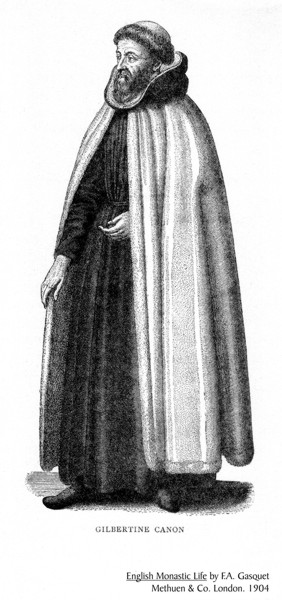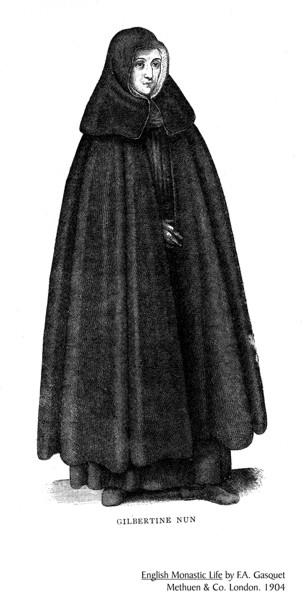|
The Gilbertines were the
only order of monastics homegrown in England and begun with seven
nuns. Included here are links to information about Gilbertines on
the internet, and information from Abbot
Gasquet's book English
Monastic
Life. Gasquet published the book through The Antiquaries
Book
series in
1904. It is now out of print and not generally available.
There may
be a number of factual errors in the text, or points on which
historians or theologians do not agree. You will also find
Benedictine Links below.
Gasquet's text>>
|
 |
 |
The Gilbertines
The Canons of St. Gilbert of
Sempringham are said to have been established in A.D. 1139, although
the actual
foundation as early as A.D. 1131, others as late as A.D. 1148. St. Gilbert, the founder, was Rector of
Sempringham
and composed his rule from those of St. Austin and St. Benedict. It was a dual Order, for both men and women ;
the former followed St. Augustine’s
code with some additions, whilst the women took the Cistercian
recension of the
Benedictine Rule.
These canons, according to
Dugdale, had a black habit with a white cloak and a hood lined with
lamb’s
wool. The women were in black with a
white cap. In the double monasteries the
canons and nuns lived in separate houses having no communication. At first the Order flourished greatly. St. Gilbert in his lifetime founded thirteen
houses, nine for men and women and four for men only.
In these there are said to have been seven
hundred canons and fifteen hundred sisters.
The order was under the rule of a
general superior, called the master or prior-general.
His leave was necessary for the admission of
members, and in fact, to initiate business or at least give validity to
the
proposals of any house. There were, in
all, some twenty-six of these establishments in England
at the time of the general dissolution. Four
only of these were considered as ranking among
the greater
monasteries whose income was above £200 a year.
English Monastic Life by
F.A. Gasquet. (pages 229)
|
Note: Gilbert
admired the Cistercian movement and to some degree adopted its
rule. He also wanted to officially bring his nuns in under its
rule and scope. His request, however, at the General Chapter
assembly in France in 1148 was denied as the Cistercians did not accept
women. According to the Catholic Community Forum, only two
Gilbertine houses existed outside England, with both those located in
Westmeath, Ireland.
|
Gilbertine Religous Houses
in
England (Additions made to Gasquet's indexed (fromUCL)
list in red. For
more English
Religious Houses, see the index page):
|
Alvingham
|
Priory
|
Double
House
(Male &
Female) |
Lincoln.
|
|
Bollington, or Bullington
|
|
Double
House
(Male &
Female) |
Lincoln.
|
|
Cambridge,
St. Edmund’s
|
|
|
Cambridge.
|
|
Cattley (or Catley)
|
|
Double
House
(Male &
Female) |
Lincoln.
|
|
Chicksand
|
|
|
Beds.
|
|
Clattercote
|
|
|
Oxford.
|
|
Fordham
|
|
|
Cambridge.
|
|
Haverholme
|
|
Double
House
(Male &
Female) |
Lincoln.
|
|
Hitchin, or Newbigging
|
|
|
Herts.
|
|
Holland
Brigge
|
|
|
Lincoln.
|
|
Lincoln, St. Catherine’s
|
|
|
Lincoln.
|
|
Maimond, or Marmund
|
|
|
Cambridge.
|
|
Malton, Old
|
|
|
Yorks.
|
|
Marlborough
|
|
|
Wilts.
|
|
Marmond
|
|
|
Cambridge.
|
|
Mattersey
|
|
|
Notts.
|
|
Newstead (in Lindsey)
|
|
|
Lincoln.
|
|
Ormesby, or Nun Ormesby
|
|
|
Lincoln.
|
|
Ovingham, or Overton
|
|
|
Yorks.
|
|
Pulton
|
|
|
Wilts
|
|
Sempringham
|
|
Double
House
(Male &
Female) |
Lincoln.
|
|
Shouldham
|
|
Double
House
(Male &
Female) |
Norfolk.
|
|
Sixhill
|
|
Double
House
(Male &
Female) |
Lincoln.
|
|
Watton
|
|
Double
House
(Male &
Female) |
Yorks.
|
|
Welles
|
|
|
Lincoln.
|
|
York, St. Andrew’s
|
|
|
Yorks.
|
|
Tunstall, near Redburn
|
|
Female Religious (Nuns)
|
Devon.
|
|
Gilbertine Links:
A short, short history from the Catholic
Community Forum.
'House
of Gilbertines: The priory of Shouldham', A History of the
County of Norfolk: Volume 2 (1906), pp. 412-14. URL:
http://www.british-history.ac.uk/report.asp?compid=38298. Through
British History Online.
'Houses
of the Gilbertine order: The priory of Sempringham', A History
of the County of Lincoln: Volume 2 (1906), pp. 179-87. URL:
http://www.british-history.ac.uk/report.asp?compid=38029. Through British History Online.
A History of Nottinghamshire by Cornelius Brown, published 1896. Ranskill
and Mattersey. Through the Nottinghamshire History site.
An article on the Gilbertine
Order from New Advent.
Corrections,
questions?
 |
|
Historyfish
pages, content, and design copyright (c) Richenda
Fairhurst, 2008
All rights reserved. No commercial permissions are
granted.
The Historyfish site, as a
particular and so
unique "expression," is copyright. However, some (most) source
material is part of the public domain, and so free of copyright
restrictions. Where those sections are not clearly marked, please
contact me so I can assist in identifying and separating that material
from the Historyfish site as a whole.
When using material from this site,
please keep
author, source, and
copyright permissions with this article.
Historyfish intends to generate discussion
through shared
information and does not claim to provide,
in any way, formal, legal, or factual advice or information. These
pages are opinion only. Opinions shared on historyfish are
not necessarily
the
opinions of historyfish editors, staff, owners or
administrators. Always consult
proper authorities with questions pertaining to copyrights, property
rights, and intellectual property rights.
It is my intent to follow copyright law (however
impossibly convoluted
that may be). Please contact me should any material included here be
copyright protected and posted in error. I will remove it from the
site. Thank you. |
|
